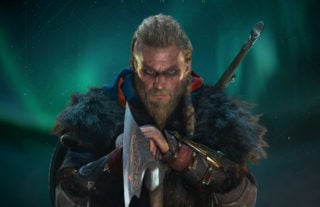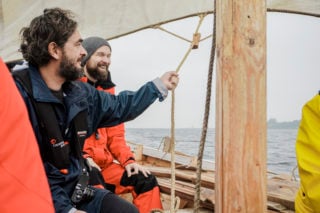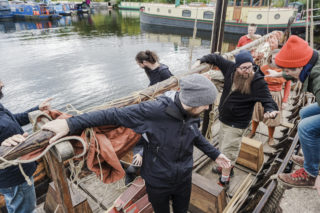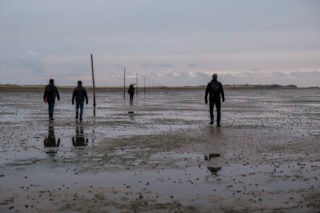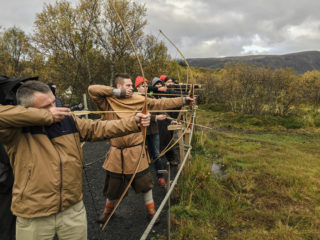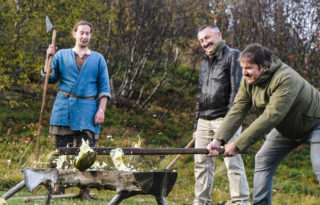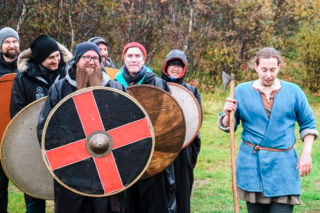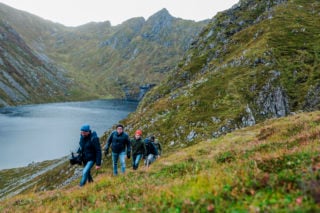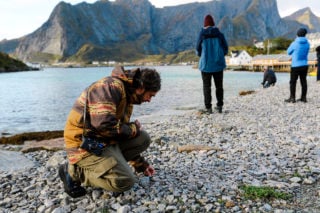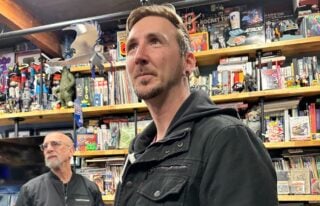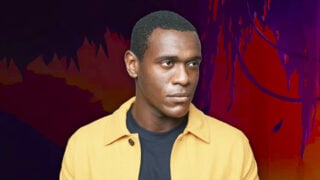Assassin’s Creed Valhalla Interview: ‘This series still has a lot of possibilities’
Producer talks game-changing features, next-gen consoles and more

Assassin’s Creed Valhalla seems intent on offering the complete Viking package.
As detailed in our Assassin’s Creed Valhalla review, players can expect plenty of Norse-fuelled adventure along with the familiar hallmarks of the Assassin’s Creed franchise, such as factional intrigue and stealthy hidden blade kills. But as your exiled Viking clan comes to England in search of new beginnings, there’s an equal focus on home life.
The development team at Ubisoft Montreal realised that bonding, singing and drinking are as key to being a Viking as raiding and pillaging.
Assassin's Creed Valhalla Guides:
In a media event this week, members of the team explained how they went on a research expedition to Norway and England two years ago. And one of the most memorable feelings they wanted to recreate from their simulated Viking experience was the relief of returning home to warmth and comfort after venturing into the hostile elements.
It’s unsurprising then that they see the home base settlement in Valhalla as such a big deal for the game, and it’s had a knock-on effect on the overall design.
“I think introducing the settlement, which is your own Viking village in the heart of England, changes the whole game structure, and the way you experience the game through quest arcs,” Valhalla producer Julien Laferrière told VGC.
It’s a feature that’s changed their approach to organising main quests and side content, and far more involving than similar home base concepts in previous Assassin’s Creed games.
“I worked on Assassin’s Creed 2”, Laferrière explained, “which was the first to introduce the concept of the home villa, and we pushed that forward in Brotherhood and Assassin’s Creed 3. But in those games it was always seen as side content, so although there was a lot of good content there, a lot of people ended up not doing it. This time we thought if we bring back this concept we should make it the heart of the experience, and it changed the way we crafted the game.”
Valhalla is set for release on consoles, PC and Stadia on November 10.
When you’re working with a very established series like Assassin’s Creed, how do you ensure that the play experience is unique each time? How have you made it unique to the setting in Valhalla?
There are a couple of important things there. First, we’ve spent three years of our lives on this game, so obviously we want to keep it fresh for ourselves. When we work on something for so long, if it was always the same thing we would get bored of it, so it’s important to stay fresh. Then there are the players, obviously, who have expectations from the new setting and also in terms of mechanics. In this case I think a lot of things were inspired by the setting. Being a Viking is a very cool and inspiring fantasy, and it drove a lot of the decisions we made on this game.
If you push forward into the gameplay elements, I think introducing the settlement, which is your own Viking village in the heart of England, changes the whole game structure, and the way you experience the game through quest arcs. It’s changed the way we deal with what we used to call side content. It puts a whole new layer of freshness into the franchise which I think will be interesting in terms of how players behave.
So those are the key things. We started with ourselves, we listened to the community and then we tried to tap into the world that we were building to keep it fresh and inspiring.
Can you explain a little more how things like discoveries and encounters with NPCs effectively take the place of the typical RPG side quest?
When we designed the game we started with the settlement, and then when building the quest arcs we felt that we had a new way of consuming the content, a new way of exploring the world. Our goal was to create those memorable moments and some memorable characters for players to discover and enjoy over the course of the game.
We found that we also had the opportunity to create these little palate cleansers by using some ideas that came up during brainstorm but didn’t make it into quests for some reason. Whether that was a good idea for a character, a cool gameplay set up, or whatever, we had a bunch of ideas for each of the territories of the game, and we bundled them together and called them ‘world events’. There are many other things for players to discover in the game, but I think world events are a good narrative palate cleanser outside of the main big story quests.
You’ve been working on Valhalla for three years, since completing Assassin’s Creed Origins. How difficult has it been to complete the project in that time frame, especially with the added problems of Covid this year?
I’m fortunate enough to have a team that is really passionate about what they do and very talented. And it’s mostly the same core team as Origins, so we already knew how to work with each other. Very early on, around this time of year right after Origins was done, we set our sights on Vikings, and because the fantasy was so clear, we were able to very quickly drill down on what it meant to be a Viking and start to run prototypes. So I feel that we’ve put those three years to almost maximum efficiency, because we immediately knew the type of game we wanted to do.
When Covid hit, the game was in a state where it was fairly well known what we had left to do. Also, we have great software and we’re lucky enough to be able to work remotely fairly efficiently. So really it was a matter of organising everything. But since we were already working in a co-dev situation where we have 15 other studios across the world, we were able to draw on our experience of working as a distributed team. It’s not like everything was made from Montreal and then we had to figure out how to work remotely. Things are led from Montreal but built across multiple studios. It’s just now we’re more distributed than ever.
“I have a Series X behind my desk and the first time I booted the game on it I was super-impressed by the smoothness that 60fps brings to the most action-packed moments or just exploring the world.”
So you didn’t have to crunch too hard to have the game ready for release this year?
Well this year was a very special year for sure, but I would say that it was almost business as usual. We were in the final year before shipping, the workload was known, and it was “just” a matter of completing it. The biggest effort I would say was with communication, and making sure the team was aligned. That required more work from myself, from the managers. But we came through it and I’m happy to have done it.
With people on the team, they’ve seen that working from home brings a lot of peace and focus. We saw some people who were super-efficient working from home, and we leveraged that efficiency. We could shuffle tasks around and reorganise some of the work to take that into account. And like I said we’re lucky enough to have a big team across multiple studios, so there were a lot of shoulders to carry this big game.
What about the experience of making a cross-generation game? Did that make it more complicated?
I don’t want to sound too cliché, but the truth is that on Assassin’s Creed we really like new toys and technology. When the first game in the franchise launched in 2007, we built our own engine to support it, and although it’s gone through multiple iterations, we still use the same engine to create the game. So with the new generation, our engineers were really happy to have new things to play with, and because of the state of our engine, we were able to support multiple platforms. All the foundation work that we’ve done on the engine makes our lives easier.
I don’t want to oversimplify things, but it was “just” a couple more platforms to add to support. Obviously we needed to leverage the additional firepower and the new features, but we are fortunate enough to have very solid relationships with the first parties [Sony and Microsoft]. We were able to get our hands on the consoles and try them out and see the sort of potential they had and try to leverage that as much as we could. It was more of a challenge, but a challenge the team was up for. They wanted to deliver on those new consoles.

Talking of the potentials in the new consoles, is there anything you’ve seen that makes you excited about developing only for the new generation in the future? Do they offer any potential ways you could approach designing a game like Assassin’s Creed differently?
Totally. I have a Series X behind my desk and the first time I booted the game on it I was super-impressed by the smoothness that 60fps brings to the most action-packed moments or just exploring the world. It’s so smooth and it’s really cool. But my personal preference is the improved loading times that we have. Simple things like using your raven or transitioning between worlds with no loading is a lot smoother on next gen.
For me the big takeaway of this new generation is to leverage not only the graphical firepower of the consoles but a lot of things that will create a better experience overall, in terms of greater immersion and more comfort for the player. I think from what I’ve seen, yes, the next gen is about graphics, but it’s also going to be about comfort, and this is what we’re trying to leverage now for Assassin’s Creed. There will be shorter loading times and a good frame rate that make the game a lot more comfortable to play, as well as stuff like better draw distance, dynamic 4K and so on.
What were the most challenging elements to get working in Valhalla?
Outside of the organisational challenge related to Covid and the technical undertakings of the new platforms, for me the biggest challenge was the inclusion of the settlement in the game. It’s so much at the heart of the experience that it changed the whole game structure. Because everything reflects back on the settlement, and there are so many possible branching ramifications, it was a technical challenge to build it the way we wanted to.
We put a lot of our best people on it and we’re super happy about the result, but it was almost like open heart surgery – you’re dealing with the most precious body part and making modifications to it and you know it’s going to completely change the whole experience. So we had to be both careful and ambitious at the same time. It was challenging but I think it’s going to be something that will surprise players.
“People might think that you could have naval battles in a game set in England during Viking times. But when you look at it, the Saxons didn’t have a lot of use for boats”
Was there anything you wanted to put in the game in the early stages that ended up being left out?
When we started we set our sights on five gameplay pillars that we thought would define the Viking experience, and looking back I think we’ve stuck pretty true to those pillars. But one example I could give would be a misconception that some of us had very early on. People might think that you could have naval battles in a game set in England during Viking times. But when you look at it, the Saxons didn’t have a lot of use for boats and when the Viking clans fought each other it was more like hand to hand combat on a ship, rather than firing at each other with arrows. And of course cannons weren’t invented then. They used boats more for amphibious warfare, rather than naval combat.
So very early on we thought naval combat was a possibility, but then we did our research and it was clear that we wouldn’t have that in the game. But that’s no bad thing because you’ll understand what it meant to be a Viking and you have this amazing longboat in the game which is a major advantage in the rivers of England. What surprised the Saxons was the use that the Vikings made of their boats.
Was there an intention to revive some of the features from earlier games in the series, such as the settlement or focus on stealth, that weren’t in the last game?
We’re fortunate enough to be building on an established franchise, which means that when we look behind us there’s some good stuff there that fans really love. I worked on Assassin’s Creed 2, which was the first to introduce the concept of the home villa, and we pushed that forward in Brotherhood and Assassin’s Creed 3. But in those games it was always seen as side content. So although there was a lot of good content there, a lot of people ended up not doing it. This time we thought if we bring back this concept we should make it the heart of the experience, and it changed the way we crafted the game.
Also, while we wanted to make a game about Vikings, we still wanted it to be about Vikings in an Assassin’s Creed world. So we tapped into the lore, and giving the main character a hidden blade and a hood and having the social stealth element fits with the time period when you think about it, because you’re living in a hostile land and sometimes you can’t always just fight your way through. Blending in, trying to avoid conflict, or sneaking your way out of things has to be an option. The major cities in the game are all tributes to that type of gameplay that was introduced in the original Assassin’s Creed.
So we definitely tried to take the best the past has to offer, but it’s also important to maintain the level of coherency, so it doesn’t feel like we’re just slapping on features just for the sake of it. It has to be relevant to the game that we’re making.

How would you say the RPG elements in Valhalla compare to Odyssey or Origins?
There are two things here. The first is that we’re trying to increase player agency in this game by offering customisation options. I think we’ve made good use of the dialogue choices in a different way than Odyssey did, where it’s all about the bigger consequences of your actions. So we’re definitely going down that route of player freedom and player agency.
But one thing we thought about from previous games was how make the experience still feel fresh after 60 or 70 hours of gameplay. So we invested a lot in variety, and we put a lot of effort into making sure the game doesn’t ask you to grind to unlock content. That was actually a priority for us in terms of making an RPG. We wanted to make sure that the game did not feel like a massive checklist that you had to go through, where you don’t feel your agency and don’t add your own flavour into it.
The same goes for collecting gear. We didn’t want players just to collect loot, loot, loot. We wanted the things that you find to be meaningful, so we transitioned to a more collection based strategy where whenever you find a piece of gear it feels relevant. It feels like a significant moment in the game, rather than you just killed another guard and that guard dropped a random weapon and you pick it up and that’s it. Because we know that players, once they find a good weapon they usually keep it and keep upgrading it, so we’re enabling that in this game.
Finally, looking into the future, are you keen to continue doing more Assassin’s Creed and do you have any vision for how it might evolve further?
The series will live hopefully for a long time, and we’ve just announced the post launch content. But right now, I won’t lie, for myself and the team the focus will be vacation. To get the juices flowing again and try to be inspired by something.
But I think what’s great about Assassin’s Creed is that because we’re dealing with history there are so many other time periods and moments that we could tap into. For me it’s a great franchise that has a lot of possibilities. And it’s great to see that franchise being interpreted in other media, with comic books and so on. So there are definitely a lot of possibilities, but for me once the game is out I will be resting for a couple of weeks. Then we’ll see about the future.


